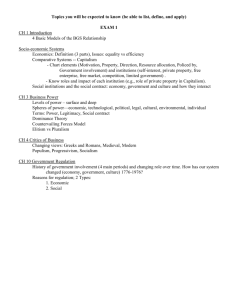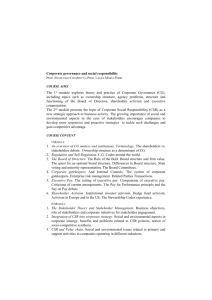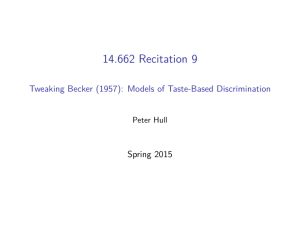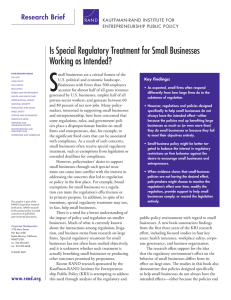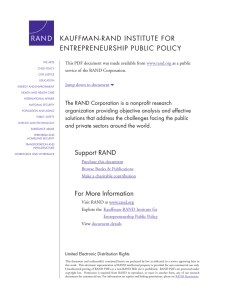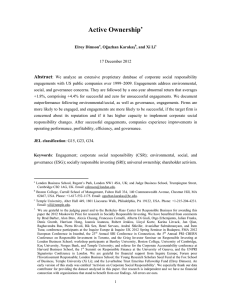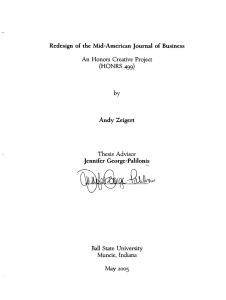Document 11233942
advertisement
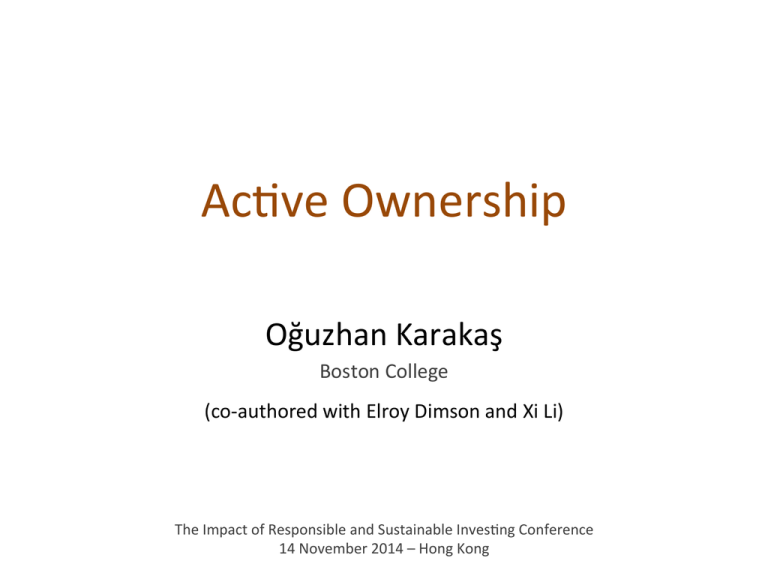
Ac-ve Ownership Oğuzhan Karakaş Boston College (co-­‐authored with Elroy Dimson and Xi Li) The Impact of Responsible and Sustainable Inves-ng Conference 14 November 2014 – Hong Kong Slide 1 of 16 Prevalence Source: Global Sustainable Investment Review, GSIA, 2013 Slide 2 of 16 Organizing Thoughts • Three views on CSR: 1. Win-­‐win (“Doing well by doing good”). (+) - Long-­‐term perspec-ve to maximize intertemporal profits. 2. Delegated philanthropy. (+) - Firm as an efficient channel for expressing ci-zens’ values. 3. Insider-­‐ini-ated corporate philanthropy. (−) - Milton Friedman (1970). - Managerial agency problem è CSR destroys shareholder value Source: Benabou and Tirole (2010) Slide 3 of 16 Contribu-ons • First to study ac-vism on social, environmental & ethical (SEE) issues. – “CSR ac-vism”: different objec-ves, tac-cs, and outcomes. – Corporate governance (CG) issues: used as a basis for comparison. • Robust performance results. – Successful engagements: 7% one-­‐year size-­‐adjusted abnormal returns. – Unsuccessful engagements: perform neutrally. • Instrumental role of collabora-on and reputa-on. - First to document the nature and impact of collabora-on among ac-vists. • Literature on CSR/SRI and firm performance. – Our data is dynamic and incremental, unlike CSR scores such as KLD. Slide 4 of 16 Data • Unique and extensive dataset of CSR engagements. – Point-­‐in-­‐-me record of engagements and outcomes. – 2,152 engagement sequences. – 613 public firms in the US over period 1999 to 2009. – Comparisons with a sample matched by sector, size and MTB. • Illustra-on of a successful engagement sequence: Raising Awareness Request for Change Milestone t0 t1 t2 7me Slide 5 of 16 Controls • Accoun-ng data: Compustat NA Fundamentals Annual. • Stock returns: CRSP; Compustat NA Security Monthly. • Analyst coverage: I/B/E/S. • Ins-tu-onal ownership: Thomson Reuters 13F. • Corporate governance: RiskMetrics. • Li-ga-on data: AuditAnaly-cs. • Shareholder mee-ngs and news releases: Capital IQ. Slide 6 of 16 Ques-ons • Which firms do ac-ve owners engage? - Likelihood regressions of being engaged. • Do ac-ve owners collaborate with other shareholders? - Hard and sor collabora-ons, and their impact on success of ac-vism. • What determines the success of CSR engagements? - Likelihood regressions of being successful condi-onal on engagement. • How does the market react to CSR engagements? - Cumula-ve abnormal returns, buy-­‐and-­‐hold returns. • What impact do CSR ac-vi-es have on firm performance? - Difference-­‐in-­‐difference analysis for ex-­‐engagement period. Slide 7 of 16 Themes # of sequences % successful Horizon (days) • Governance – Corporate gov’ce (CG) 900 211 149 – Business ethics – Sustainability mgt & rptg • Environmental – Public health – Human rights – Labour standards Total/Average (SEE) Source: Table 1 & 3 525 647 284 24 14 9 156 77 221 – Climate change – Ecosystem services – Environmental mgt • Social 10 10 18 521 512 386 31 182 225 1,215 7 10 17 13 622 591 410 474 100 18 503 Slide 8 of 16 Collabora-on • Hard Collaborators # of sequences % successful – SRI Fund 415 – Pension Fund 137 – Asset Manager 62 – Financial Ins-tu-on 27 – Religious Fund 23 – Other 48 All hard collaborators 712 • Sor Collaborators 540 – Code, Principle, Ini-a-ve, Standard, Bill 231 – Forum, Network, Coali-on 92 – Peer, Media 66 – Ins-tute, University, ThinkTank, Center 15 – Other 1,090 All sor collaborators Source: Table 4 52 32 48 63 48 60 48 32 36 86 30 46 39 Slide 9 of 16 Targe-ng: in words Which firms do ac7ve owners engage? • Large and mature firms. – Economies of scale (consistent with tradi-onal shareholder ac-vism). • High adver-sing intensity. – Consumer-­‐oriented industries with reputa-onal concerns. • High shareholding. – High vo-ng power. • Weak corporate governance. – Firms with headroom for improvements. • Targe-ng strategy. – Rela-vely ac-ve but less aggressive than HF ac-vists. Source: Table 6 Slide 10 of 16 Success: in words What determines the success of CSR engagements? • Large firms. – Benefits scalable, fixed costs of change more affordable for big firms. • High cash holding and low capital and R&D expenditure. – Less financially-­‐constrained. • High adver-sing intensity. – Consumer-­‐oriented industries with reputa-onal concerns. • Corporate governance insignificant. – Inconsistent with insider-­‐ini-ated CSR. • Engagement strategy. – Rela-vely ac-ve but less confronta-onal than hedge funds. Collabora-on increases the success rate. Source: Table 7 Slide 11 of 16 Performance Cumula7ve Abnormal Return (CAR) rela7ve to Ini7al Engagement Source: Figure 1 Slide 12 of 16 Mechanisms • Aurac-ng socially conscious consumers and increasing consumer loyalty. – Higher sales and profitability. • Increasing employee loyalty. – Higher efficiency. • Aurac-ng socially conscious investors. – Higher shareholdings. – Lower stock return vola-lity. • Signaling future governance improvements. Slide 13 of 16 Explana-ons • Is the outperformance just good stock picking? – Abnormal returns only for engagements that are successful. • Do targets implement only the profitable proposals? – No indica-on that well-­‐governed firms have higher abnormal returns. • Do firms wait for stock to rise, and then adopt proposals? – Abnormal returns do not explain engagement success. • Why don’t firms voluntarily engage in CSR themselves? – Target firms face agency issues: they have inferior governance. – Firms can benefit from direc-onal guidance from the investor. Slide 14 of 16 Conclusions • 7% yearly abnormal return for successful engagements. – No market reac-on to unsuccessful engagements. – Posi-ve reac-on to governance and climate-­‐change engagements. • Firms that are targeted reveal: – Greater reputa-onal concerns, inferior governance, headroom to improve. • Determinants of successful CSR change. – Collabora-on, reputa-on, economies of scale, scope for improvement. • Outcome from CSR change. – Improved opera-ng performance, profitability, efficiency, and governance. Slide 15 of 16 Download ssrn.com/id=2154724 Slide 16 of 16
